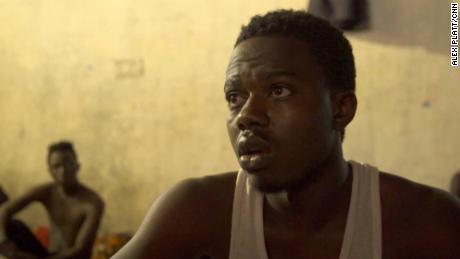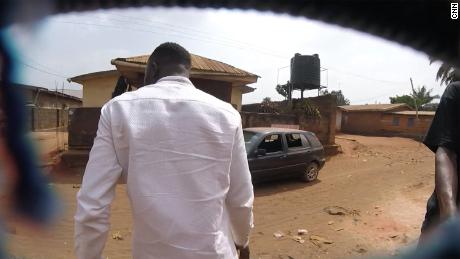Benin City, Nigeria (CNN)Dressed casually in slim-fit jogging pants and a T-shirt and sporting a trendy haircut, 21-year-old Victory looks like many of his peers in Nigeria. But one thing distinguishes him from the crowd: Victory is a former slave.
CNN first met Victory last October, just days after he was rescued from traffickers in Libya and the most appalling conditions imaginable. Lying on the floor of a squalid detention center, he was exhausted, depressed and desperate to go home.
In January, he was one of several hundreds of Nigerians repatriated from Libya with the assistance of the International Organization for Migration. Now back home in Edo State, he reflected on his ill-fated attempt to reach Europe, saying it all began with a desire to create a better life for his mother and younger siblings.
"Everything I do is because of them," he said, his voice breaking as he fought back tears. "I believe that I have to be somebody tomorrow."
Nigeria's trafficking hub
Victory's story is not uncommon in this part of the world.┬ĀEdo State is Nigeria's trafficking hub and one of Africa's largest departure points. Each year,┬Ātens of thousands of migrants┬Āare illegally smuggled from here. They're refugees fleeing conflict or economic migrants in search of better opportunities in Europe, most having sold everything they own to finance the journey.
After seeing photos posted on social media by friends who had successfully made it to Europe, he decided to pay a smuggler to take him on the same route to Italy.
In July 2016, Victory, along with about a dozen other Nigerians, was put on a public bus bound for the northern city of Kano by smugglers. From there, they boarded another bus to Agadez in Niger before traveling by car to Sabha in southwestern Libya. Victory spent his life savings on the trip.
It's similar to a route traffickers offered two undercover CNN reporters in February, who were warned they would likely be raped during their journey.
Eight harrowing months
Victory says he was exhilarated upon arriving in Libya -- his destination finally appearing within grasp.
But his optimism disappeared when traffickers informed the group that travel beyond Libya had not been paid. Instead, the smugglers became their captors, demanding each migrant pay another $1,000.
With none able to pay the fee, they were herded at gunpoint to waiting vehicles, taken to a nearby farm and sold into slavery. There, Victory said, they were subjected to hard labor, beatings and forced to make frantic calls to family begging for ransoms that might secure their freedom.
Eight harrowing months after he was taken captive, his mother managed to borrow enough money and Victory was released.
After being enslaved by smugglers and then detained in a Libyan migrant center, coming home should have been a happy reunion for the family. But Victory soon learned the ransom demands had prevented them from paying rent. While he was held captive, his family had been evicted.
Afraid to be a burden
Victory was heartbroken, but that would be only the first of many reality checks he would encounter on his return. Now, he has nowhere to live after opting to stay away from his family because he doesn't want to burden them further.┬Ā
Even though he is no longer being held against his will, Victory is still very slight -- eating one meal a day at most.
"Maybe if I want to eat dinner, maybe (I'll eat) once ... that should be in the evening," he said, again near tears. "So that is just it. If I was to come down here to sit down with them, eat with them, where there is not even much food to eat ... I just have to face everything on my own."
Victory is barely out of his teens but he will forever be scarred by his traumatic experience at the hands of men who treated him no better than an animal. As he recounted his story, he eventually broke down, the consequences of his decision to leave weighing heavily on his young shoulders.┬Ā
An eye on the future
CNN informed Victory that the international response to last year's report was overwhelming, and that many people had hailed him as a hero for surviving his ordeal.
For the first time since he started speaking, a wry smile tugged at the corners of his mouth, a wink and a nod to his new-found fame in the community.
"I feel like a hero. A lot went there and didn't come back alive," he said.
Many returning migrants like Victory come home to a poverty that they find even more dehumanizing than some of the horrors they faced in Libya. But Victory is convinced, ultimately, that he will find his happy ending -- that much like he did in Libya, he will once again find the strength to survive.
"I have to do something with my life," he said. "Things will go well. I just have to move on with my life."










